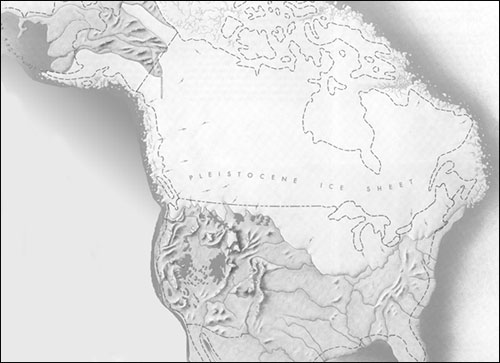The Cycle of Cosmic Catastrophes:
Flood, Fire, and Famine
in the History of Civilization
by Richard Firestone, Allen West, and Simon Warwick-Smith
Posted on 12/21/2006 2:45:15 PM PST by blam
December 21. 2006 6:59AM
Turning back the clock 10,000 years
Scientists explore land bridge, petrified trees in Lake Huron.
PONTIAC, Mich. (AP) -- Scientists hope to learn more about what the Great Lakes' shorelines looked like about 10,000 years ago.
They explored a limestone land bridge that went from Alpena, Mich., to Goderich, Ontario -- a distance of about 125 miles -- and an underwater forest of petrified trees in Lake Huron.
The 2006 research, in which more than 500 dives were made, is the subject of a documentary film, "Great Lakes, Ancient Shores, Sinkholes." It premiered recently at the Cranbrook Institute of Arts in Bloomfield Hills, The Oakland Press reported.
Another study is planned for 2007 and should result in a second film, "Great Lakes, Ancient Shores," said Luke Clyburn, lieutenant commander of the Great Lakes Division of the U.S. Naval Sea Cadet Corps and a Great Lakes ship captain.
"What we are learning about the Great Lakes of several thousand years ago may change the way we think of this area," Clyburn said.
Clyburn and other scientists have been filming in the Great Lakes for at least 25 years.
There is a petrified forest in 40 feet of water in Lake Huron about two miles offshore from Lexington, Mich., he said. Some of the trees have been carbon-dated to indicate they are 6,980 years old.
The Straits of Mackinac, a passage between lakes Michigan and Huron, have been spanned by the Mackinac Bridge since the mid-1950s but didn't exist several thousand years ago, Clyburn said.
"Lake Michigan was much higher than Lake Huron, and the two did not join as they do today at the straits," he said. But water from Lake Michigan seeped underground toward Lake Huron and the two bodies of water eventually became connected.
Clyburn's current film focuses on a sinkhole in Lake Huron about two miles from Alpena near Middle Island. In prehistoric times, the sinkholes were on dry land. Americans Indians lived near these sinkholes because they provided water, which attracted game, he said.
I remember my college geology professor talking about the last iceage in 12,000 BC that leveled northern Indiana Illinois and Ohio down to about half way between Indianapolis and Louisville. I think he said there was some speculation that Lake Michigan could have been widened or deepened at the beginnng of the glaciation period.
Besides the scouring of the glaciation, there must also have been some folding of the earth's crust, because the lakes are DEEP.
The Cycle of Cosmic Catastrophes:
Flood, Fire, and Famine
in the History of Civilization
by Richard Firestone, Allen West, and Simon Warwick-Smith
Please FREEPMAIL me if you want on or off the
"Gods, Graves, Glyphs" PING list or GGG weekly digest
-- Archaeology/Anthropology/Ancient Cultures/Artifacts/Antiquities, etc.
Gods, Graves, Glyphs (alpha order)

Generalized geographic map of North America in Pleistocene time.
another great link:
http://www.halinet.on.ca/GreatLakes/Documents/HGL/default.asp?ID=c002
Once on a trip back home to Hawaii from California I was sitting by a young gal from upstate N. Y. who had never been any where before. I mean not even to N.Y. City. She was to meet her hubby there who was on R and R from the military stationed in Japan. As we swung around to land she said , "I didn't know Hawaii was on a lake" . I said , Yes, it's a big lake called the Pacific Ocean. LOL True story. Then to top that off she said do you live here. I said no, I live on the island of Maui. She said, how long will it take you to drive over there.
How does noe carbon=date petrified wood?
Why would anyone go to a foreign country to site see when there are so many wonders to see in our own country.
"Paddle to the Sea " bump
I was born in Chicago. I know live in Virginia
When I was a kid I thought Lake Mich was an ocean, but had a lake name. Sorta like calling everyone aunt and uncle, but they are not related.
Great pic.Reminds me of a show i watched on the History Channel re:Edmund Fitzgerald and killer storms on the Great Lakes.More miles of shoreline than the entire left coast?I'm not surprised-but must agree it's difficult to imagine.With that much area,hydrologically it is more like an "ocean" than a series of lakes.
Yes, but our tides aren't like an ocean. I've never seen measurements on them. And they will freeze more quickly because there's no salt. They seldom freeze over completely, but when they do our winters are extremely cold and windy.
Michigan.....? Never heard of it.
Jack, you must have been drunker than I thought. Last I checked MuskieGone is in Michigan and right on the shore of that 2nd biggest of the the Great Lakes.

That wasn't a greeting. They were just trying to give directions since you were obviously lost.

FYI, The pseudo tide in the Great Lakes is called a "sache."
You can probably find info on Google.
I blame global warming.
Note: this topic is from 12/21/2006. Thanks blam.
|
Disclaimer: Opinions posted on Free Republic are those of the individual posters and do not necessarily represent the opinion of Free Republic or its management. All materials posted herein are protected by copyright law and the exemption for fair use of copyrighted works.